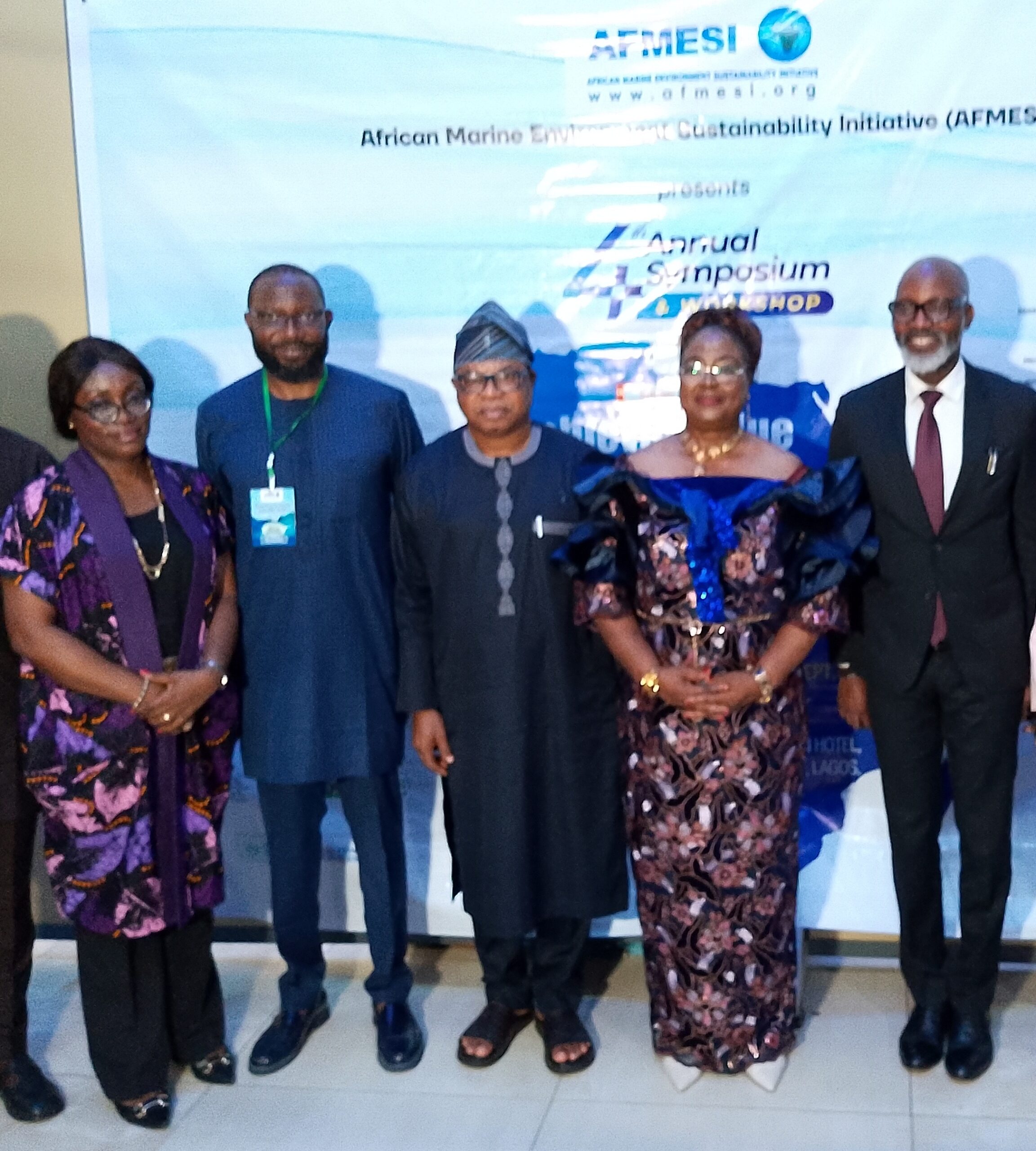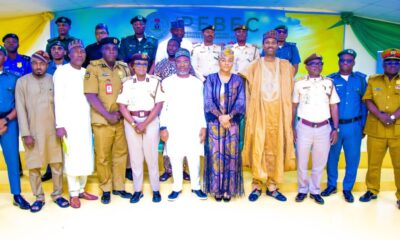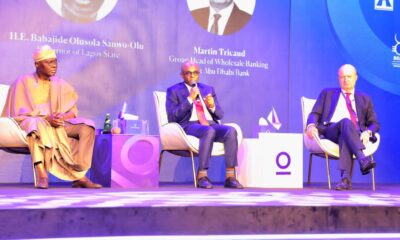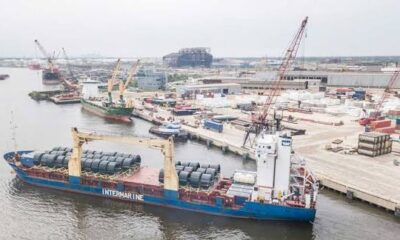Business Focus
Experts’ Highlights Nigeria’s Stake In Global Carbon Credit

BY EGUONO ODJEGBA
Experts in the nation’s marine subsector Tuesday, September 24, 2024 disclosed that large swatches of mangrove forests and tropical expanse of land within and beyond the southern region are rich in carbon dioxide and remains a huge economic potential if its byproduct, carbon credits are properly harnessed and marketed.
Speaking during the 4th Annual Symposium and Workshop of the African Marine Environment Sustainability Initiative (AFMESI), the experts stunned participants and stakeholders who converged at the Best Western Hotel, Victoria Island Lagos, on the economic prospects of forests and tree types rich in carbon properties, which is currently trending as a defining component of the blue economy and a subset of global climate change.
The Minister of Marine and Blue Economy, Hon. Adegboyega Oyetola who declared the workshop open, encouraged participants to engage in viable discourse that can address associated challenges in the blue economy. Oyetola who was represented by Prof. Stephen Fakinlede, a director in the ministry noted that the ministry is committed to safety and a sustainable blue economy.
Earlier, President of AFMESI, Dr. (Mrs.) Felicia Mogo said the group’s initiative is aimed at establishing innovative financing mechanisms that will support blue economy projects across Africa.
“We aim to attract investment in sustainable ocean industries, from eco-friendly aquaculture to renewable marine energy, and to ensure that these investments benefit the communities most in need. We will work with financial institutions, government agencies, private organizations, among others to achieve this goal.”
“Over the years, AFMESI has championed numerous projects and initiatives in Nigeria, and across Africa, aimed at protecting our marine ecosystems, empowering coastal communities, and advancing policy frameworks that support sustainable marine practices.”
Regarding its dreams, mission and visison, Dr. Mogo said: “The African Marine Environment Sustainability Initiative (AFMESI) was founded on a core mission: to ensure the sustainable management and conservation of our marine and coastal environments while fostering economic growth that benefits not just businesses but also the millions of people whose livelihoods depend on these precious resources. Over the years, AFMESI has championed numerous projects and initiatives in Nigeria, and across Africa, aimed at protecting our marine ecosystems, empowering coastal communities, and advancing policy frameworks that support sustainable marine practices
“However, as we look ahead, it is clear that our work is far from finished. Climate change, biodiversity loss, and unsustainable exploitation of marine resources continue to threaten the health of our oceans and the well-being of the communities that rely on them.”
This is even as she outlined some future targets of AFMESI, spread over its first five years strategic plan, and based on five key pillars.
The 2-days workshop with the theme “Achieving Blue Growth in a Changing Climate (Integrating the Coastal Communities) provided insights in the emerging new world of renewable energy plan, with a focus on the interplay between climate change and blue economy; within the Nigerian and sub regional context.
In his presentation, the Executive Director, Tantita Security Services, Capt. Warredi Enisuoh said that whereas the negative effects of climate change is huge, he bemoaned the lack of adequate information associated therewith, noting that there also positive developments already been harnessed by the developed economies that can transform the fortune of coastal communities, nationwide.
According to Enisuoh, one of such tradeoffs is carbon credit schemes currently been deployed by the western worlds to counterbalance the debilitating effects of climate change.

He explained carbon credit as a process based activities that identify the carbon value system that exists within particular green laced ecosystem such as forests and other kinds of vegetations rich in properties and able to stabilize the corroding effects of climate change.
Disclosing that Tantita Security has tapped into this knowledge to assist in its national assignment, he says coastal communities within its areas of operations in the Niger Delta can benefit exponentially from carbon credits and help to further change the cause of youths unrests and perceived lack of neglect by the authorities.
He equally stated that one mature tree can absorb 80kg of CO₂ from the atmosphere in a year and noted that several developed countries have adopted the carbon credit initiative to preserve their environment.
While informing that it takes into account particular technical skills to be able to assess or value forests and bushes for their carbon credits through studies and researches, he declared that “Those with the right knowledge of carbon credits can then negotiate for the development of their communities.”
For example, Enisuoh said bamboo trees are known to produce more oxygen than any other trees in the coastal regions and therefore possess higher carbon offsets; which he says is already trading in some countries stock exchange markets in Europe and America.
“Tantita engages in environmental mapping to be able to understudy the area as a support to our security task. So, to be able to enjoy the benefits that carbon credits offers, you must understand what you have, because you can only sell what you have.
“The foreign bodies involved need adequate and correct information which you must provide through your data. You must be able to convince them with your data, to indicate the sort of carbon offsets you have. We undertake geo-tagging of the areas with carbon offsets in our operations, so knowledge is power.
“Communities could become rich if they have educated, trusted representatives that clearly understands the carbon offsets that exists within their domain. One carbon credit is equal to one ton of CO2.
If we allocate 50,000 trees per coastal community, one carbon credit is equivalent to one ton of carbon dioxide which is valued at $50. CO₂ absorption per year = 80kg x 50,000 Trees = 4,000,000kg. Earning is 4,000,000kg x $50/1,000, which is $200,000 per year.”
He, however, lamented that despite the recent signing of the Climate Change Act by Nigeria, the federal government is still investing in the acquisition of diesel-powered trains.
While admonishing maritime operators to approach the new concept with genuine desire to grow the national economy and enhance the security of its ecosystem, the Tantita poster boy said Nigerian has what it takes to continue to attract international shipping based on the emerging demand for renewable fuel in navigation.
He explained that with the right preparation, Nigerian Ports Authority (NPA) can exchange carbon offset for funds, which in turn can be channeled into port automation.
“NPA can give these foreign vessels calling our ports clean power instead of burning diesel through generators. This is because it can exchange these carbon offsets for credits and in turn, even negotiate the automation of its operations. De-carbonization of our ports can create lots of offsets and opportunities.”
The Managing Director of National Inland Waterways Authority (NIWA), Mr. Bola Oyebamiji was amongst dignitaries that graced the occassion. Others are Secretary General of the Memorandum of Understanding on Port State Control for West and Central African Region (Abuja MoU), Capt. Sunday Umoren; Managing Director of Lagos Free Zone (LFZ), Barr. (Mrs.) Adesuwa Ladoja; President, Ocean Ambassadors Foundation (OAF), Hon. Olaitan Williams.





































